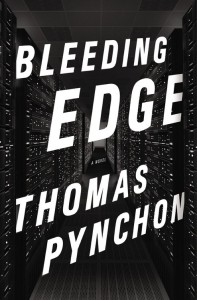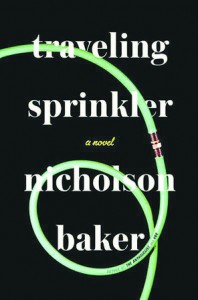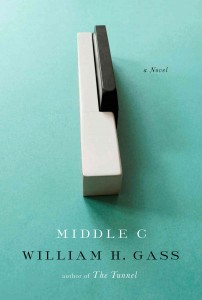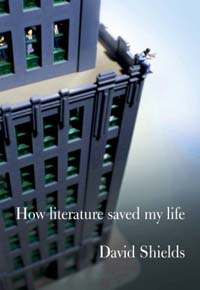The Day Irony Stood Still: On Thomas Pynchon’s Bleeding Edge
 Bleeding Edge
Bleeding Edge
by Thomas Pynchon
Penguin Press HC, Sept 2013
496 pages / $28.95 Buy from Amazon or Indiebound
“I met a lot of hard-boiled eggs in my life, but you — you’re twenty minutes.” — Lorraine Minosa, Ace in the Hole (1951)
The appeal of the hard-boiled character archetype is their indefatigable coolness, their aloofness. We seem to like characters who react in seemingly inhuman ways to moments and situations in which the rest of us would be too consumed by nerves or emotions to construct a sentence, let alone a biting bit of wordplay. These characters are mostly at home in the dimly lit offices and back alleyways of the film noir detective, but we see permutations of the archetype every time we encounter a dominant lead with a penchant for mouthing off to baddies with guns.
Hard-boiled works best with snoops, and Thomas Pynchon has veered his career into continuing to explore the limits of this character type, setting up camp everywhere from the Revolutionary War (Mason & Dixon) to 1980’s California (Vineland) with a cast of irreverent characters who never cease to check the self-importance of not only their verbal sparring partners, but of moments themselves.
But what Pynchon has chosen to explore in Bleeding Edge, his seventh novel, is what would happen if you took all of those Pychonian elements of irony and placed them in a time and place in which it didn’t stand out, and was, in fact, par for the course.
Maxine Tarnow, a rogue (or at least de-licensed) fraud investigator and single-ish (it’s complicated) mother of two, plays the part of our protagonist. She is, as teh novel opens, approached by Reg Despard, a filmmaker acquaintance, to look into the finances of a shady enterprise called hashlingrz, a deep-pocketed Internet company buying up infrastructure and failed start-ups that went under after the .Com bubble burst, a fate which hashlingrz itself somehow sidestepped. From there, we begin to fall headlong into lengthy list of classic noir tropes: the numbers that don’t add up, the seedy-yet-likable characters of the city’s underbelly, the overseas connections, and yes, even an homme fatale. New York City looms large (doesn’t it always?) as the book’s backdrop, not simply because of Pynchon’s love for it — Bleeding Edge is an unashamed love letter to the city — but because of what we all know to be coming: the book begins in March of 2001, and will lead us by the hand through nearly a year, including, of course, 11 September. If there’s reason to question Pynchon’s decided lack of in-depth development for any of the book’s other characters, it’s because New York itself is our secondary — or perhaps even primary — protagonist, itself “twenty minutes” in hot water.
Maxine, in all her hard-boiled glory, is Pynchon’s representation of irony incarnate, not that other sources aren’t otherwise readily available. But it’s through her that the book drives home it’s final point re:the death or non-death of irony, which is that 11 September did not kill irony, a claim that has manifested itself countless times in the last twelve odd years. What it did was remind us that irony doesn’t work all of the time, and for it to retain its bite, you have to allow for moments of fear and sincerity and bravery, not to mention silence. “For many people, especially in New York,” Pynchon jabs, “laughing is a way of being loud without having to say anything.”
When discussing postmodernism in general, and Pynchon in particular, these days, irony is the word burning on every tongue of every critic/commentator, easily the most vilified and misused word of the past decade and a half.
It’s nearly impossible to discuss postmodern irony without making reference to “E Pluribus Unum: Television and U.S. Fiction”, the ubiquitous essay by the late David Foster Wallace that decried mass culture’s co-option and subsequent neutering of irony, and proposed a revival of sincerity.
“The next real literary ‘rebels’ in this country might well emerge as some weird bunch of anti-rebels,” Wallace wrote, “born oglers who dare somehow to back away from ironic watching, who have the childish gall actually to endorse and instantiate single-entendre principles. Who treat of plain old untrendy human troubles and emotions in U.S. life with reverence and conviction. Who eschew self-consciousness and hip fatigue.
While a new group of authors, Wallace, Franzen, Safran Foer et. all, ushered in a new era of sincerity in high art, the true cultural rot that Wallace had warned against wasn’t happening in lit mags, but quietly on the lower rungs of the cultural ladder. Most people took DFW’s essay as a grand metaphor for literature, but anyone with any cursory biographical knowledge of Wallace would know that he loved, to the point of addiction, bad television. And it was here that Wallace saw the writing on the wall. The Mark Leyners of the world were never the problem. Literature was too diffuse even then to really have the sort of devastating societal ramifications that Wallace foretold; but if you lose sincerity in “low” art, when it embraces what it is and no longer holds any pretensions about maybe passing as the “real” thing, and when it multiplies like wildfire, you’re doomed.
““Ain’t like I was ever Alfred Hitchcock or somethin,” Maxine’s filmmaker friend/client-pro-bono Reg admits proudly. “You can watch my stuff till you’re cross-eyed and there’ll never be any deeper meaning. I see something interesting, I shoot it is all. Future of film if you want to know—someday, more bandwidth, more video files up on the Internet, everybody’ll be shootin everything, way too much to look at, nothin will mean shit. Think of me as the prophet of that.”
December 2nd, 2013 / 12:00 pm
Nicholson Baker’s The Traveling Sprinkler
 The Traveling Sprinkler
The Traveling Sprinkler
by Nicholson Baker
Blue Rider Press, Sept 2013
304 pages / $24.85 Buy from Amazon
Before we begin the review proper, an interesting parallel.
Nicholson Baker, in his 2011 Paris Review interview, on the writing of The Mezzanine: “It was totally absorbing, the feeling of being sunk in the midst of a big, warm, almost unmanageable pond. I could sense all these notes I had, all these observations I’d saved up to use, finally arranging themselves in relation to one other.”
Paul Chowder, Baker’s protagonist in The Traveling Sprinkler, quoting Claude Debussy answering a question about his compositional process: “Gradually after these thoughts have simmered for a certain length of time music begins to centre around them, and I feel that I must give expression to the harmonies which haunt me.”
Chowder, again, quoting Freud, “There are no coincidences.”
We first met the middle-aged poet Paul Chowder in 2010’s The Anthologist, as he attempted to write an introduction to a poetry anthology while navigating myriad distractions, from his lost lady love to the wealth of poetic knowledge residing within his own head. He was Baker by proxy, the writer of dirty books laid bare as an astute intellectual who has money and love problems, copious idiosyncrasies, and who just happens to have a masterful knack for nicknaming male genitalia (“Shropshire lad” being a particularly outstanding one this time around).
For The Anthologist, Baker recorded himself in various locations talking into a camera, attempting to be honest and naked in a way that writers often refuse to be behind the carefully composed written word. Honesty in writing, after all, is always edited, and has the benefit of a first draft.
Similarly, The Traveling Sprinkler, made heavy use of audio recordings, self-interviews, that were later transcribed and tinkered with and embellished into the continued adventures of Paul Chowder, who now finds himself owing a new book of poetry to his faithful publisher, who has now quit drinking Yukon Jack in the meantime, who wants to learn the guitar, who can only seem to write when parked in the shade in his Kia, who has once again lost Roz.
While The Anthologist was very much a book about poetry (well, among other things), this book chronicles our narrator’s love affair with music, from his early years as a promising bassoonist (a career path that was derailed by a basketball accident), to his new obsession with both singer-songwriters and modern dance music. Underworld is namedropped, Debussy’s “The Sunken Cathedral” is dissected in an out, and YouTube URLs to college students singing protest songs awkwardly conclude paragraphs left wanting for proper final punctuation. The only thing missing is an official Traveling Sprinkler Spotify playlist. Excuse me while I make one.
Are there any critics of serious literature remaining that vehemently oppose the appearance of modernisms in novels? If so, poor things, keep them away from The Traveling Sprinkler.
The line between Baker and Chowder is once again thin, if not opaque, but, like the book’s namesake Sears product, winds along in anything but a straight line. It can, admittedly, be distracting, as someone who obsesses over the biographical details of authors, to have to pause and wonder if what you’re reading is really how Nicholson Baker really feels about dance music or drones or climate change or even peanut butter crackers. When we read an obviously fictitious novel, we’re free to get swept away, but with Baker so close under the surface, we want him to be the one talking to us. This may, admittedly, be a hang-up limited to serious enthusiasts, and that particular longing shouldn’t be mistaken for critique.
What Baker has accomplished here is to give us, along with late-period David Markson, the best look into the writer’s brain, one that no Paris Review interview could even begin to reveal. More specifically, the aging writer, the one who no longer voraciously reads, and whose head is full of facts and knowledge, but who faces the very real possibility that the well might be dry and all that is left to do is a sort of self-inventory for posterity. The secret is, of course, that writers of all ages are doing just that, perhaps dressed up in a grand narrative or imaginative forms, but that nonetheless. Just ask the 31-year-old that wrote The Mezzanine.
The parallel with Markson is an interesting one, as Paul Chowder admits to never having been able to read novels, while Markson admitted (both in interviews and later by way of his own thinly guised fictional protagonist) to having run out of drive to read them, and that with five of his own still to come. Both writers eventually stumbled upon a groove in which they became literal anthologists of the contents of their minds, Markson right up until he died.
In an all-to-brief and somewhat stilted interview on The Colbert Report, Baker likened the traveling sprinkler to us, navigating the garden of our minds. I’m not sure there exists a more perfect, if idiosyncratic, metaphor for writing, although what force it is that pulls us along is still up for debate. Regardless of your answer, it’s worth celebrating that Nicholson Baker still has plenty of hose left.
***
James J. Fitze is a writer and editor living in New York City. A music journalist “in a past life,” James currently contributes to a living novel at thedownmachine.com.
November 22nd, 2013 / 11:00 am
On Identity in William Gass’s Middle C
 Middle C
Middle C
by William Gass
Knopf, March 2013
416 pages / $28.95 Buy from Amazon
In a recent interview with the Los Angeles review of Books, William Gass cited a fellow titan of high postmodernism when asked about the role of obsession in his fiction. “[William] Gaddis maintained that the writer needed an obsession; he or she would then worry about it like a cat with a rag. The obsession may be hard to spot and it took me some time to discover mine: the stupidity of mankind, its misuse of reason.”
If the common thread of Gass’s fiction has ever been too translucent or opaque to put your finger on, with that sentence he gave us the decoder key to his entire oeuvre.
And where do human beings misuse their reason more than in regard their own self-image? This is the question that Gass chooses to plumb in Middle C, just the third full-length novel of his otherwise prolific career.
Middle C, in the makings for a decade and a half, comes along at a time when neuroscience is probing more and more deeply (and for some, uncomfortably) at the question of what exactly makes us us. Experimental psychologist and author Bruce Hood opined in his 2012 book, The Self Illusion, “If we are so susceptible to group pressure, subtle priming cues, stereotyping and culturally cuing, then the notion of a true, unyielding ego self cannot be sustained. If it is a self that flinches and bends with tiny changes in circumstances, then it might as well be non-existent.”
And it’s hard to argue. We are funny creatures that, largely through trial and error in testing social boundaries, concoct these permanent-if-illusory entities we like to call selves, ideas which are only further hardened whenever they are challenged by evidence of their amorphousness. Or, as it’s elegantly put with regard to our protagonist, “In Joey’s case, ignorance encouraged certainty.”
But before we ever meet Joey, aka Professor Joseph Skizzen, we are introduced to his father, an Austrian patriarch named Rudi Skizzen who decides to give he and his family new, Jewish identities in order to escape the advancing Nazis and gain asylum in England, where Joseph is born as Yussel Fixel. Of course, all along we have the sneaking suspicion that Rudi is less concerned with his family’s safety or complicity in the atrocities to come, and more ashamed of — or maybe even just bored of — his Austrianness.
In England, with wartime sympathy for the refugee class waning, Rudi reinvents himself once again as janitor and gambling man Raymond Scofield, before his ultimate dematerialization, leaving his family behind and, we’re lead to believe, making off for the New World
The story then picks up in Ulrichstown, Ohio with Joseph, who, right from adolescence, seems uncomfortable as a member of the human race. As he would express as a more articulate — and equally rancorous — adult, “the desires that men displayed, either alone, at social clubs, in political parties, or as communities, leagues, and nations, were fundamentally so measly and uninteresting, and the methods employed to achieve them so borrowed, makeshift, and inadequate, that what was eventually obtained was a shambles, leaving their suitors dissatisfied, angry, and searching for more satisfactory targets.”
Still, in a fit of irony, Joseph discovered something he did want to be: Austrian. And an educated Austrian he would become. Using his imagined Austrian upbringing and a love for “difficult” modern music to boost his air of superiority, Joseph lucks and feigns his way into a position as Professor of Modern Music at the tiny, austere Whittlebauer College, a position for which he is, er, under qualified for, by some measure.
September 13th, 2013 / 11:05 am
David Shields — How Literature Saved My Life
 How Literature Saved My Life
How Literature Saved My Life
by David Shields
Knopf, February 2013
224 pages / $24.95 Buy from Amazon or Powell’s
Published last month, How Literature Saved My Life is both a boldly written love note to a most precious of subjects, and David Shields’s latest statute in his quest for “art with a visible string to the world.” Short of a true sequel to his polarizing 2008 “novel,” Reality Hunger, Shields’s latest work does devote more than a little page space to proselytizing for his vision of a world where fact and fiction combine and literary tropes like linear plot lines and fanciful character design fall by the wayside.
Sharing my current reading choice with friends — and an unsolicited suggestion that they look into it — it was a common to hear, But isn’t it just for writers and literature snobs?
Well, yes.
Casual readers may be able to sieve out the life lessons, but will likely find themselves drowning in a sea of name drops and literary in-jokes. Which is not to say that a novice reader couldn’t use the book to take studious notes and build a respectable reading list, but I wouldn’t consider that sort of parergonal use to be a huge selling point.
Truth is, how many summer readers are going to pick up a book called How Literature Saved My Life in the first place anyway? And it’s probably my fault for recommending it for a general audience, because it isn’t. Shields makes no bones about writing for a niche audience, one he can’t help but self-consciously wonder about with a market analyst’s zest, a fact of life for virtually any creative professional these days, whether we like it or not. Unabashedly, Shields probes this and other insecurities writers in the digital age run up against with far great frequency and impact than their predecessors.
Is literature worth writing anymore? Can it adapt without losing whatever attributes make it recognizable as “literature”? Who am I writing for? Franzen: Why bother?
For literary types with similar doubts, Shields’s writing comes across prescriptive, offering answers to questions lie those raised by Jonathan Franzen in Why Bother? (originally published as Perchance to Dream: In the Age of Images, a Reason to Write Novels), and in one sense answering David Foster Wallace’s charge against forms of literature that have no remedy for the ills they diagnose.
March 29th, 2013 / 12:00 pm
